Felix Mendelssohn's 'Midsummer Night's Dream Overture' Sounds The Way A Shakespeare Comedy Feels

The title of this week’s column is a big dumb joke, because “a little night music” is the loose translation of Mozart’s Eine Kleine Nachtmusik (which you know, obviously, if you know literally no other classical music). But I’m not writing about Mozart this week; I’m writing about another big M in the catalog, and that’s Felix Mendelssohn who wrote the Midsummer Night’s Dream Overture. And it’s short and it takes place at night. So it’s a little… night… fuck it, I’m sorry, let’s move on.
Thought we were done with moody Germans? You couldn’t be more wrong. Mendelssohn, however, predates Brahms & Co., situating him with some of the early Romantics, like our old friend Hector Berlioz. Mendelssohn was born in Hamburg (which just so happened to be the same independent German state where your old favorite was born) in 1807. Like the other big M (again, this is what I’m calling Mozart this column, just go with it), he was a child prodigy. The Midsummer Night’s Dream Overture, for example, was written in 1826, the year his family got a copy of the Shakespeare comedy. Which means, if you can do math on your phone, Mendelssohn was a teenager when he wrote it. Is this what we’re capable of without the internet? Don’t tell me.
What’s most notable, perhaps, about this overture is that is that it kind of invented the overture as we know it. So say, in your head right now, you try to visualize the type of music that an overture is, you wind up with something that preemptively summarizes a larger thing. We know them mostly from musicals and operas these days. You hear all of the central themes of the music you’re about hear, and then you hear the actual music. Pretty normal thing. But Mendelssohn composed this overture in 1826, as I wrote before, and didn’t add on any of the incidental music until nearly 20 years later at the request of King Friedrich Wilhelm IV of Prussia. So what we have in our overture is really just, well, an overture.
And what an overture it is! This was a new piece for me, sent along by a reader (which you can do too!), as I had originally intended to write about Mendelssohn’s far moodier Violin Concerto (and maybe someday still will). It’s a relatively short piece: my preferred version is by the London Symphony Orchestra from just this year, and I much prefer the slightly slower Allegro di molto at about six minutes in length. It grabs you right from the beginning with four soft and delicate chords on the woodwinds, like the sound of an alarm clock you don’t fully hate just yet.
Then the strings get going — still quiet, but beckoning, building. The first big chord of the piece lands about 1:18 minutes in with a big triumphant melody. Big timpani, big brass, sweeping strings and woodwinds. It’s not unlike Festive Overture, only predating it by about 125 years. It’s wildly playful. It feels like reading a Shakespeare comedy should feel: light and buoyant but dense with theme. I’m thinking now of the melody that comes in at the 3:13 mark, backed by heavy timpani notes, with little runs on the strings. It’s fun! The melodies in this overture are seductive but not sexual. It wants to be liked and enjoyed by the masses. I’m thinking of teenage Mendelssohn composing this because it’s the kind of music he wanted to listen to as a young person, in the way that I assume young people like, uh, Ed Sheeran or whoever.
Because this is an overture, it bounces back and forth between key melodies without any kind of hyper-formal structure you’d see in a symphony movement or a concerto. In turn, the ending kind of comes up on you. The climax of the piece once again features quiet strings moving ever so quickly together, punctuated occasionally with very very loud brass chords. Around the 5:20 mark, you can tell it’s building to something: the creeping pizzicato always feels somewhat foreboding. But rather than coming to some big triumphant conclusion, it settles itself. Not unlike the soft woodwind chords it began on, the Midsummer Night’s Dream Overture puts itself back to sleep.
Fran Hoepfner is a writer from Chicago. You can find a corresponding playlist for all of the pieces discussed in this column here.
Kristen Stewart Is The Vinho Verde Of Actresses
Torre de Vila Nova 2015 Vinho Verde
Nevada City Wine Diaries

Last Friday I went dancing until 2 a.m. at a gay bar in Sacramento. There was probably a day in my not-too-distant past when I would have been too embarrassed to admit that I was taking in the nightlife of this unsung city with such joyful abandon. The truth is, I find myself warming up to Sacramento. I mean, it is the city that’s closest to me, so to not warm up to it would be at this point be self-sabotage, and in case you haven’t heard, self-sabotage is the thing that fucks up our lives the most. I know you thought living in a garbage country where people try to pay you nothing to do shitloads of work was the problem but you’re wrong. Your life sucks because you never go dancing in Sacramento.
After driving home Saturday morning, I was exhausted and my whole body hurt. I took a three-hour nap and when I woke up I looked to see what movies were playing. They were all about monsters and space and other things I wish would just go away. The only thing I remotely wanted to see was the Olivier Assayas movie Personal Shopper, which came out in New York probably a couple months ago but is only now made it to my sleepy Sierra Foothills town.
I texted the Little Red-Haired Girl to see if she wanted to see Personal Shopper. She asked me what it was about and I said “It takes place in Paris and it’s about ghosts and shopping.” She said “sold.” A half an hour later, we were sitting in the fourth row of our town’s tiny independent theater. This theater is so tiny that the bathroom is next to the screen so if you want to go to the bathroom during the movie you have to get in everyone’s way. This is fine except for once I had to go to the bathroom twice, and was humiliated.
Five seconds into the movie, onto the screen walks Kristen Stewart. The Little Red-Haired Girl and I turned to each other and said, in unison, “Holy shit, is that Kristen Stewart?” What can I say. We are bumpkins. I saw Clouds of Sils Maria — saw being a synonym for “cynically suffered through” — and though I knew Assayas directed it and that Stewart was in it I wasn’t aware she had become his “muse.” Pause as someone rolls up the roll-up vomitorium. Pause as I enter, vomiting.
Don’t get me wrong. I don’t begrudge Kirsten Stewart for having a well-paid job in the arts that allows time off for Hobbies and Personal Reflection. But she annoys me. She seems to project signs of being interesting without actually being so, other than of course that time she made out with that married man in Griffith Park, which was amazing.
The Little Red-Haired Girl was drinking wine and she asked if I wanted any. I saw that it was Vinho Verde. I don’t find Vinho Verde terribly interesting either, but if it wants to go make out with someone in Griffith Park I might reconsider.
Right away Kristen Stewart — who plays a character improbably named Maureen Cartwright — started doing what Kristen Stewart does which is to walk around train stations and ateliers looking very put upon and bored with Paris with her sweater cuffs pulled down over her wrists. Sometimes she drove around a scooter with the same expression.
Sometimes Maureen Cartwright dismounted the scooter, desultorily removed her helmet and desultorily flipped through racks of beautiful clothes at chic ateliers (are there non-chic ateliers? I’m really asking!) muttering things like “This will work,” or “I can see this on Kira.” Oh, and Maureen Cartwright also really loved text messaging. If you do not like watching people named Maureen Cartwright text message in real time, this movie is not for you. Finally, if Maureen Cartwright has a superpower — aside from communing with the dead — it is abandoning half-finished bottles of beer. At one point, on the Eurostar, or waiting for it — who knows, who cares — she took ONE SIP and then skulked off, playing with her dirty hair. I call bullshit on that. Unless of course you mean to tell me that Kristen Stewart is the only woman in the world who makes out with married dudes in Griffith Park but doesn’t finish beers.
So that’s the meat of what we see on screen. The “story” underlying these endlessly repeated visuals, or the series of unlikely and not relatable premises (and like, I get that movies aren’t supposed to be real, but these literally felt as if they had been pulled from a hat/beret) taking the place of an actual story is this: Maureen is working as a personal shopper for a bitchy actress, the previously mentioned Kira. Additionally, she is marooned in Paris because her twin brother died there of the same heart disease/excuse-to-show-her-naked-at-a-cardiologist’s-office from which she herself suffers. She doesn’t want to be a personal shopper because it’s a stupid job and it doesn’t give her enough time for her passion, which is creating black-and-white sketches. Her black-and-white sketches are fine, but not quite as good as the sketches that the executive editor of Eater, who actually has a real job, just does on Facebook for fun. So she is both working as a disgruntled personal shopper and occasionally visiting a chic but empty mansion her brother somehow managed to buy at the age of 27, where she tries to talk to his ghost.
The film’s “narrative drive” (aside from “Will she go visit her boyfriend in Oman who Facetimes her a lot, even though they both seem to be gay or at least not attracted to each other) “centers” around her waiting for her brother’s ghost to give her some kind of sign. To my mind, he seems to oblige. Some kind of primitive cross appears in the plaster on the stairwell wall. “Was this there before?” Maureen Cartwright asks her brother’s young French widow — Mrs. Cartwright?—who just shrugs, because, whatever, it’s just a spooky haunted mansion, who knows whether those terrifying pre-Christian symbols on the wall were drawn by an evil demon or just the previous owners? Then the ghost leaves the water running — twice. But no sign is ever good enough for Maureen Cartwright! “I need more,” she says, burrowing into her sweater cuffs, engaging in the haphazard fidgeting that is Kristen Stewart’s standard response to everything from mild annoyance to an unexpected visit from Satan.
I kept hoping the ghost’s sign would be something like a sudden cool breeze at Maureen Cartwright’s wrists, and suddenly, she would feel the light pressure of ectoplasm, helpfully rolling up her sweater cuffs. Or, even better, if the ghost was like “Hey, hear that water I just turned on? There’s a shower in there! And get this — there’s even SOME SHAMPOO. God I remember when I was alive how great that stuff was! Wait — have you ever heard of shampoo?” But alas, this was not to be.
Sorry, I swear to God I will stop after this, but I thought of one more great thing the ghost’s sign could be: It could put a “SMILE” bumpersticker on her scooter. Look, I realize men telling women to smile is awful, and believe me, if Resting Bitch Face were an Olympic Sport, I would be on a Wheaties box. But Kristen Stewart’s moroseness is endless and tedious. (Actually, they were probably not going to have a dead brother in this, but after realizing that Stewart was incapable of even the smallest gesture of levity they were like “Let’s have someone die and then have her wait for a sign from him and never like any of the signs enough” and everyone was like “Totally, great idea.”)
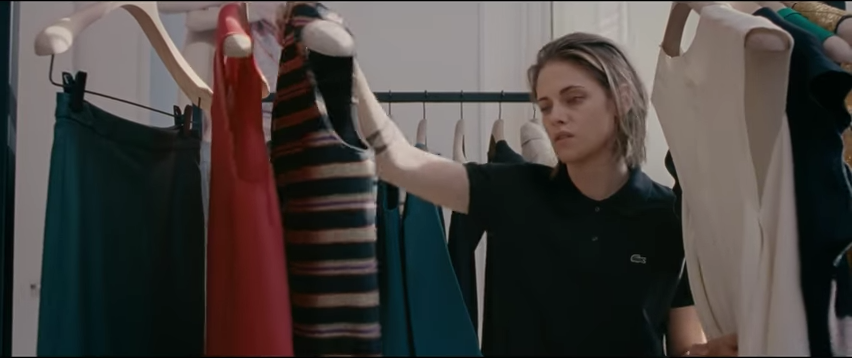
It is especially tedious considering how many famous film critics seem to think her shuffling about and glowering and scoffing amounts to something. Manohla Dargis — who thought Clouds of Sils Maria (so arid, so pretentious it seems like a joke) was “superb” said of her: “Ms. Stewart easily holds both her own and the screen alongside Ms. Binoche, delivering the kind of emotionally translucent performance that first got her noticed as the girl with the guitar in Into the Wild.” First of all, what was this gasp heard round the world when Kristen Stewart appeared in Into the Wild and what was I doing that night? Second: “Emotionally translucent” — what the fuck does that even mean? That you can tell what she’s thinking? I guess maybe that’s true, except if what she’s thinking is always “OK, now I am going to fake not-finish another beer,” who needs to know?
Here is Anthony Lane, also reviewing Clouds of Sils Maria. He quite reasonably recognized it for the risible Eurotrash it is, although he liked Stewart: “It is she (Stewart) rather than Binoche, who lingers in your mind when the film is over, and leaves you musing on what comes next; Valentine, chafing at her job, with her uncool spectacles and her droopy shrugs, somehow holds the greater promise.” Stewart plays the same person in CLOUDS she plays in personal shopper — the exact same — but with glasses. Also, I’m troubled that Lane doesn’t know uncool spectacles are cool. I mean, I live in a town where the biggest store is called Spirit Weaver, and even I know that.
Variety’s Todd McDonald rings the closest to reality, referring (also talking about CLOUDS) to Stewart’s “habitual low-keyed style, which can border on the monotone.” Hmm. Let’s think of some other things that border on monotone. Wow, I really can’t really think of anything, because no one ever bothers to talk about such things, unless they are Kristen Stewart, or maybe — Vinho Verde?
Back to the film, where, suddenly, there is a murder. “I didn’t see that coming at all,” said the Little Red-Haired Girl. “Why,” I said, “Is it because nothing in this movie has anything to do with anything else that is in it?” At one point you think Maureen Cartwright could have committed the murder, then some automatic doors at a business hotel open and close despite there being no one actually opening and closing them, because, maybe, it’s a ghost? Who knows?
Then Maureen Cartwright, taking on the same tone she might use to describe misplacing her ATM card for fifteen minutes, tells her gay boyfriend that she was almost framed for a murder. She pets a dog. Then she has coffee with Mrs. Cartwright’s new boyfriend, who is so bad at acting that I think Assayas’ assistant put an ad in the French version of Backstage reading “American man, 25–35” and cast the first non-hideous dude who showed up. Then the brother’s ghost finally breaks a glass at Mrs. Cartwright’s new place (not the old haunted one) but Maureen Cartwright doesn’t put two and two together, because that might involve trying. Maureen Cartwright goes to Oman, where — after all this time hanging out in a haunted mansion, that stupid ghost reveals it can break glasses any old place , and breaks another glass. And now — because God forbid Maureen Cartwright ever be satisfied — she doesn’t even think the ghost is her brother. She wonders if the ghost might actually be her. Jesus, Maureen Cartwright!
I have two words for these French movie shenanigans. WHAT and EVER. At least we didn’t have to see her and her “boyfriend” have to pretend not to be gay.
“I feel like movie stars should be rated on whether or not it would be fun to go dancing with them in Sacramento,” I said as the credits rolled.
“I agree,” said the Little Red-Haired Girl. “I would never take Kristen Stewart to Sac. She didn’t even like Paris.”
And so, now that this was over, of course, I was ready for a drink. Luckily there was some Vinho Verde left, and it was still slightly cold, appealing but not overpoweringly so, with a nod towards tartness, but not tart enough and inoffensive but bit dull NOT UNLIKE SOMEONE ELSE WE RECENTLY SPENT A LOT OF TIME WITH. Vinho Verde is young Albariño, which can be really good if it has some bracing acid, but this one lacked backbone so it was just eh, fine. Still it’s one of those things that people get excited about even if it’s not that good because sometimes they’ve heard of it and it’s supposed to be cool. I had a glass, and then, even though I didn’t really want or need one, I had another, because it was there.
Call It Shit Town
Because that is its name.
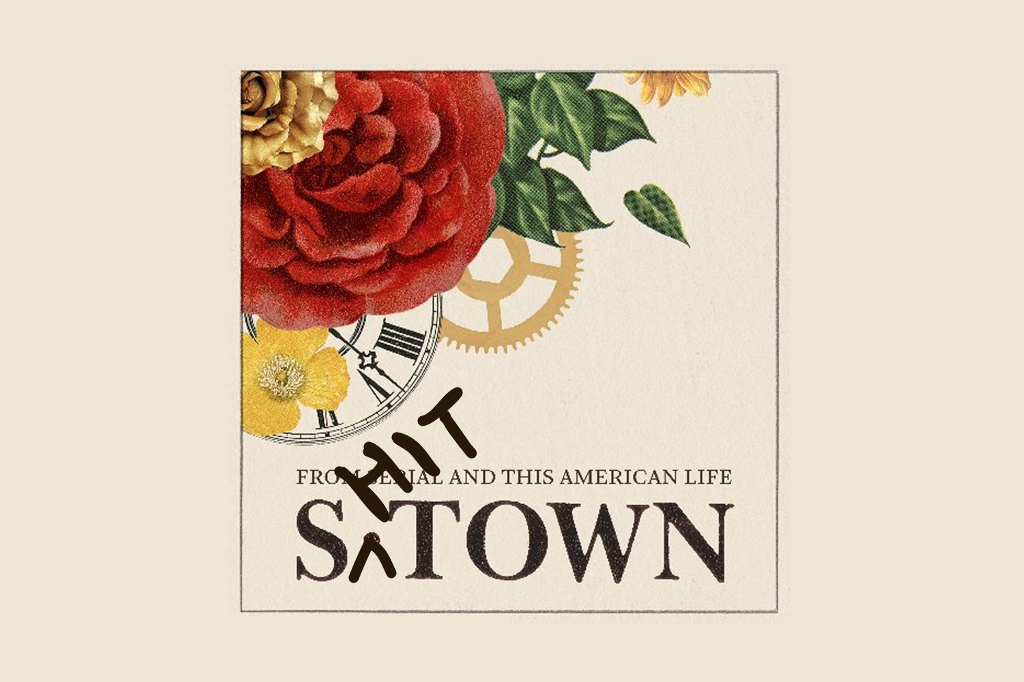
A sloppy Voxxer says that the new podcast from Serial and This American Life never should have been made. There is a much more convincing essay to be written supporting that thesis than the one that got published, but I’ll leave The Parsing of The Ethics to the professional Janet Malcolm-citers. Let’s get to the real shit.
“The shit is not the shit,” a man thinks to himself in a perfect passage from Zadie Smith’s White Teeth, “the pigeon is the shit.” Also, the title of this podcast, despite what every blog would have you believe, is Shit Town. (Shit town? ShitTown? Shit-Town? Mail….kimp? Shit•Town? It definitely begins with “shit.”) I know this because host Brian Reed says so at the beginning of every episode! “This is ‘Shit Town,’” he tells me. Thank you, nice to be here.
Even the name of the show is actually “Shit Town,” the owners of the show — the creators of “This American Life” and “Serial” — have decided to package and market it as S-Town. Its title on iTunes is S-Town, and its various social media handles are all S-Town.
I understand why “This American Life” did it. “Shit” would gum up the SEO of the take-industrial complex; the New York Times is not going to put “shit” in a headline or anywhere else in the article, so give them something that they can. And it’s probably hard to get the scams that advertise in podcasts to offer introductory rates at blueapron.com/shittown. But there is no good reason for bloggers to go along with what The New Republic admits is “advertised euphemistically.” (TNR still used “S-Town” in its headline, but to their credit, went with Shit-Town in the body.)
Just because advertising employs euphemism does not mean you have to. As Barry Petchesky wrote last year, the fact that someone is paying for a name does not mean that they are paying you to call it that. No sponsor is paying for it to be packaged as S-Town, but that was still a conscious choice by the people who own a show that is actually called “Shit Town.” You don’t have to call it S-Town.
Excepting newspapers’ hard no-cussing line, that means you, Wikipedia, AV Club, Vanity Fair, CNN, Vulture, The Huffington Post, Nerdist, Entertainment Weekly, Mashable, BuzzFeed, The Atlantic, The New Republic, Vox, The Verge, Slate, Heavy, Wired, The Daily Dot and particularly f*cking you, Vice.
It’s the internet. Go ahead and say “shit.” Shit Town’s press office did not respond to a request for comment; I recommend giving all seven episodes a listen if you have a minute. It’s good shit.
Dennis Young is an editor at FloTrack with a shitty Twitter account.
A Poem by Alan Felsenthal
Alphabet
I was a victim of laughter.
They set the alphabet
like a river
into which the names of God
bound by letters
sank.
I was dumb
for they called me so.
I smelled
water and lime
when I searched
for love
and watched
smart men sign
their names in smoke
over the ovens of Niesse
the poorest women
burned inside.
When I woke centuries after
the oven still alive
I remembered my father
said the devil was no cloud
of black flies
but an educated man
who lived by two hands
that invented the devil
to give him human help.
The devil heard this
and cried
not out of sadness
but to try
something new.
I cried too
for now I knew
not what crying
meant.
Alan Felsenthal runs a small press called The Song Cave. With Ben Estes, he edited A Dark Dreambox of Another Kind: The Poems of Alfred Starr Hamilton. His writing has appeared in BOMB, The Brooklyn Rail, Critical Quarterly, Fence, jubilat, and Harper’s. Published by Ugly Duckling Presse, Lowly is his first collection of poems.
The Poetry Section is edited by Mark Bibbins.
Soulphiction, "B3B4URD1"
Let’s hear it for the heroes who stayed in bed today.
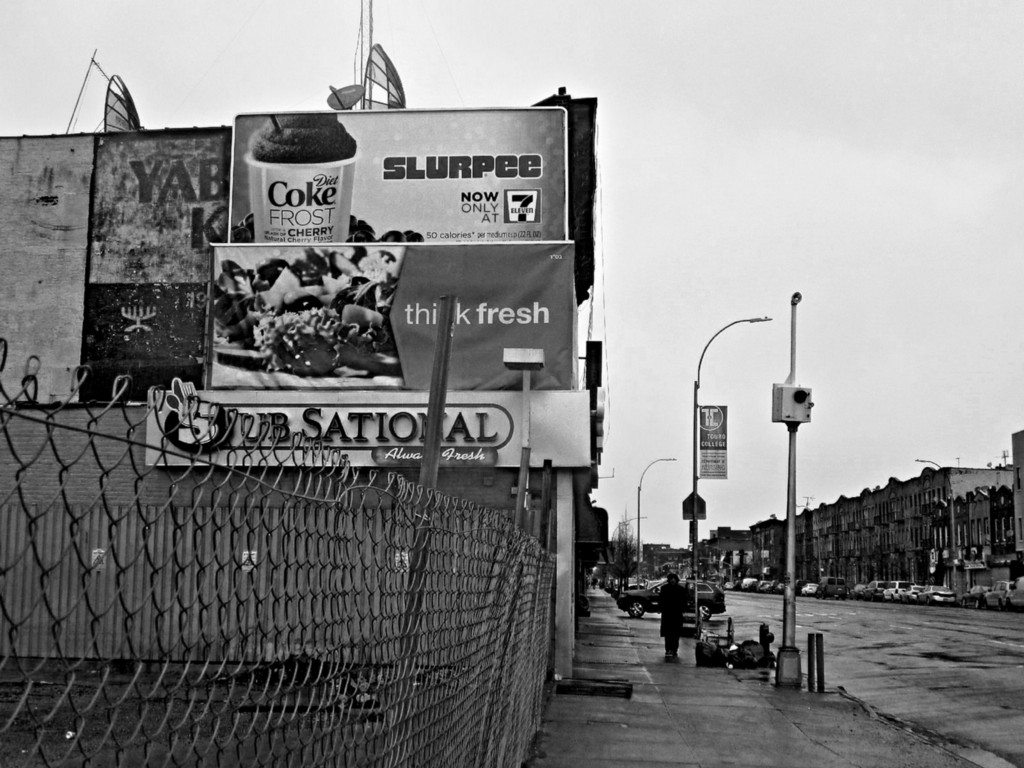
If you are a climatologist charged with creating the standard definition for the field of atmospheric sciences to use when describing “go back to bed weather” you could do far worse than to scribble down today’s conditions and use that as your guide. If you are anyone else you should probably just go back to bed. If that is impossible please press play on the track below, which will make you move a bit and generally distract you from how horrible it is out there. Enjoy.
New York City, April 4, 2017

★★ Though rain had speckled the windows, all that fell on the walk to school was drizzle. After that one mercy, the morning did not get any better. Nothing nice was happening out in the forecourt, and the turn onto the cross street met a cold wind. Fog was not far overhead. The downtown local track bed for the Broadway line at Times Square was a canal, fed by flow from the ceiling. The drizzle stopped; the midday was tolerable enough to wait outside a food truck for tacos. Briefly there was sun on a water tower. At rush hour the fog was back, making the top of the Empire State Building fade in and out while downtown a well-formed layer of cloud chopped off the Freedom Tower partway up, sharply.
The Most Important Thing Right Now Is That You Stop Being Mean To Anne Hathaway
“Everyone does it” is not a good excuse anymore.

In case you were distracted by the terrible war crimes in Syria and the horrifying pictures of its innocent children dying in indescribable agony, you should know that the word has gone forth this week that it is no longer okay to hate Anne Hathaway, an activity which is apparently all anyone in America has done during the last five years. Perhaps you were too busy making barely enough money to live on in our struggling economy, or raising your children, or taking care of a sick parent — whatever, I’m sure you’ve got an excuse — to partake in the nonstop nationwide orgy of excoriation directed at the Oscar-winning actress, but you are the exception, and now the media has decided that the whole thing has gone on long enough, that too many people have been hurt, and that it’s time (propitiously, right as her new movie comes out) for the 217,992, 214 active Hathaway haters (estimate: U.S. Census Bureau) to stand down. It’s 2017, you guys: There are considerably more pressing concerns on which to attend. Please make a note of it.
Feist, "Century"
Feist + Jarvis Cocker = Nostalgia For Less Terrible Times

Remember 2007? Jarvis Cocker had his first solo record out and Feist’s Reminder was everywhere. Ask an older friend if you don’t know what those words mean. Anyway, we eventually tired of it, but if someone came up to you now and said, “Here’s a ticket to ten years ago” you would take that ride in a second and kill the person giving you the ticket before he had the chance to change his mind. Back in the glowing atomic shithole of the present, Feist has a new album coming out and she’s touring soon and here she is with a song that features Cocker doing his breathy monologue thing on it. Enjoy. If we’re still around in 2027 let’s hope we’re not musing about how comparatively less awful 2017 was.
You Need To Relax, Bro
Spring Break in Isla Vista

As the sun sets over the glittering Pacific Ocean, a girl in a fuchsia bathing suit tells me, “It’s pretty much always like this.”
The it she is refereeing to is Isla Vista, suburb of Santa Barbara, commonly thought of as a college town for UCSB. The this is a party, one of the largest I’ve seen outside of reality TV shows. The soundscape is provided by various portable speakers that get kicked around amongst the dancers who are mostly are college students, some curious locals. The party’s theme is ambiguous, as is the number of cultures it pays homage to — some people wear leis and tribal makeup, some bindis, some drape kimonos over their bathing suits and drink out of halved coconuts. They have tiki torches and small fireworks. They carry surfboards and boogie boards and long boards and skateboards and skateboards shaped like surfboards, and men pull dogs on skateboards shaped like surfboards.
There is swimming and limbo. Scantily clad bodies gyrate and tumble over one another in hot pursuit of a volleyball. A few faces in the crowd look familiar. I’ve met them. I’ve crashed in their beds and regretted standing barefoot in their bathrooms. I’ve heard them try to order tacos at IHOP. I have watched them drinking cheap vodka out of an inflatable swimming pool. In the water, fluorescent bikinis and board shorts and visors move like schools of large tropical fish. Later, they come together to make a fire. There is no sense of ephemerality to their partying, only time, ongoing like the winding coast.
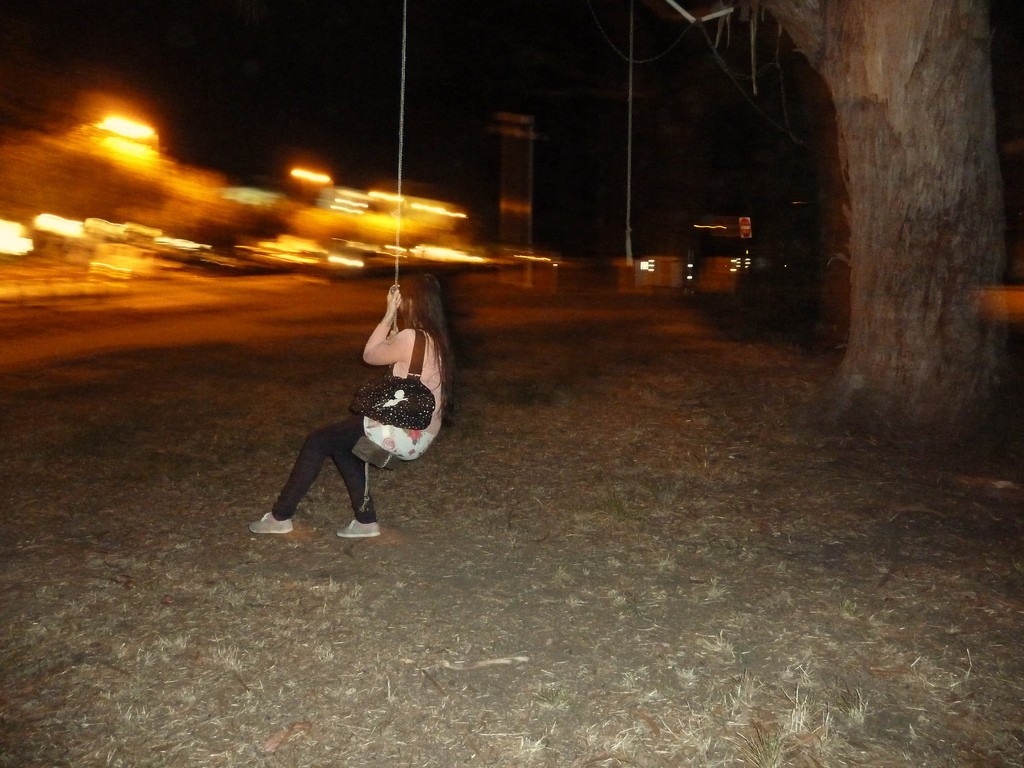
Fuchsia bathing suit says a lot of people come this time of year. Kids who go to school in colder regions come for spring break. All who visit Isla Vista, for one reason or another, feel a need for spontaneity. Perhaps they, like me, felt too comfortable in a routine of school and work and want to prove their gall and youthful durability by wearing scandalous maritime garb and sleeping on questionable mattresses.
The town has exactly what they are looking for — mindless fun, if you consider this kind of thing fun, that is. Disaster lurks in every beer bong. The ocean is perilous, with jutting rocks that could skewer and shred these tender partiers like wet paper. Walking on the sand, one could get a fragment of shattered glass lodged in their foot or prick a finger upon picking up a razor blade they mistook for a shell glinting in the sun. Then, of course, there is the fatal amount of alcohol these bouncing bodies consume nightly. With the mixture of ecstasy and sun exposure and E. coli from the local Taqueria, it is a wonder there is anybody left to return to class. Not to mention the parasailing. Needless to say, spring break is a death trap.
My car broke down upon arriving in Isla Vista. There is a notable lack of mechanics for a hundred miles in all directions as if on purpose, blurring the line between partier and hostage. A group of girls and I checked into an Airbnb and soon missed our home’s modest amenities as though they were those of a five-star hotel. The room we stayed in was a converted garage that was sparsely furnished: a rug, a shelf, a book of astrology, and one twin-sized bed. A layer of sand coated all surfaces in the house. Our hosts were six boys who attended the nearby college and one girl whose name escapes me but whom, for the duration of the trip, we called Shelly. Upon our arrival, around 11 a.m., Shelly promptly offered us a round of shots and a bong rip like a cruise might offer its guests a free continental breakfast.

Our hosts kept alcohol like some might stock canned foods for the apocalypse. Bottles filled the cabinets: whiskey, rum, gin; half full, a third full, some only with the sticky brown residue left at the bottom. Cans of PBR, Budweiser, forty ounces, tallboys, piles of the plastic six-pack circles that penguins get stuck in. Canned margaritas, daiquiris, piña coladas, and squirt guns filled with Smirnoff. Sprite, soda, Red Bull, coffee, no filters. There were many glass contraptions to smoke out of and many boxes that once held pizzas. There was a Twister mat on the floor being used as a rug. The dartboard had kitchen knives jutting out of it. The darts were being used to pin up an Eric Clapton poster.
Wanting to spend as little time in Shelly’s house as possible, we set out toward the beach, which was within walking distance. Sand became a part of things. It was in our clothes and our beds and our sandwiches. It went unnoticed after a while. On the beach were people who, like Shelly and her housemates, had an affinity for drinking and doing dangerous things. They cannonballed off rocks and dragged their squealing female companions into the foamy surf after them. Yet nobody seemed to recount any tragedies. “I’m a senior and it’s been smooth sailing,” explained a guy on the beach who wore his towel like a cape. “Except that thing with Benji, but he just can’t eat soybeans anymore.”
The people of Isla Vista don’t fear things. They are happy being ignorant of alcohol poisoning and seaweed nooses. The only worry I sensed from our beach company was about an impending econ final that nobody seemed prepared for, or proactive about becoming so. I found myself envious of their serenity. A bumper sticker on a local’s van that read, “You need to relax, bro,” became the mantra of the trip.
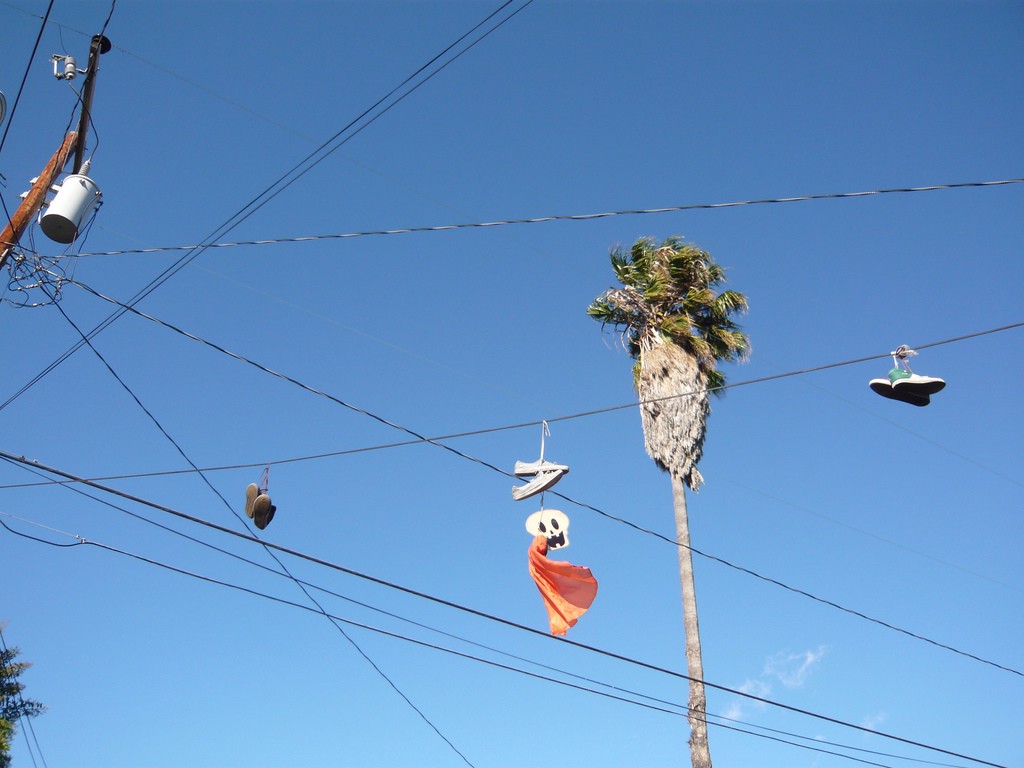
The town had an anachronistic feel in that information was spread not through cell phones but people screaming information in the town center. This is how we were tipped off about the beach party where I wound up talking to the girl in the fuchsia bathing suit. She remained in only her suit for the rest of the night. It did not get cold. Many people didn’t even feel the need to take off their sunglasses. The girl excused herself from my questioning, explaining that this party, more packed with people than Times Square at New Year’s Eve, was dying out and she had to flock elsewhere.
Along the bluff was a grain field with a picnic table in the tall grass. You could watch the sun set from the table and the tide swallow the beach below. People were draped over the table and lying in the comfort of the surrounding ice plants. Some were watching a girl dance with a hula-hoop in lieu of a partner while others watched the sky. There was no light pollution. A friend noted how she never gets a minute to just appreciate the stars. In Los Angeles, where we had come from, you’d be lucky to see an airplane through the smog. Here, the cosmos was a vast governing force blanketing the sandy village. A few people lifted their sunglasses.
At one point that night, I ended up in my car with no intention of driving. It smelled familiar, as if all the comforts of home could be found in the upholstery. Outside, the little beach houses lit up and locals biked and skated through the puka-shell-string doorways. The dwellings were tacked up clumsily, certainly unable to withstand the natural disasters that came with living on a fault line. It wasn’t that there was no sense of danger, but no sense of a future. This place survived day by day. With just a few adjustments to my muffler, I could be back in a world of structure and opaque clothing, but not Shelly and towel-cape-guy. They would stay here. Their minute of appreciating the stars had extended to years. This wasn’t a just bizarre vacation; they would never repair their houses, get the sand out of their hair, or pass econ. The town kept everyone in a purgatorial state and all I could do was watch through the windows of my Hyundai.

Shelly and her housemates were right where I had left them, throwing knives at the dartboard. The room was cluttered with our suitcases packed for three days. We only stayed the one. A few of the girls who’d come with me were strewn around the room, their complexion unnaturally pale for all the time they’d spent in the sun. A girl sat up from where she had been sleeping on an air mattress. There were a few flustered moments as she took in her surroundings before she leaned over and threw up into my backpack, which sat open and welcoming by the bed. She inspired another girl to spew across the coffee table, her stomach acid covering some tarot cards and a packet of Hostess cupcakes, and once more on the uncarpeted floor. This resulted in many three-stooges-style slips as various people ran in to be of assistance. The house did not have a mop.
I followed one girl who careened toward the bathroom and flopped over the toilet. This is how I first came into contact with Shelly’s bathroom. The tile was caked in dry toothpaste and shampoo buildup (which is to be expected in a small house with so many tenants) and that was crusted over with a sort of mildew film. But what couldn’t be explained was the black residue in every crack and corner. It was thick and looked to be the texture of oatmeal. Rogue hairs from shaving and trimming stuck to the black fungus, resembling the body of a furry caterpillar. Crouched on this floor and leaning over the vomit-filled bathtub, the girl turned to me with a look I will never forget. Her hair was mangled and her eyes were all pupil, as black and empty as the L.A. sky. It was a look rarely seen outside of horror-movie victims before they are stabbed to death. I heard the bumper sticker taunt, “You need to relax, bro,” as she curled up into a ball.
The next morning, we got the car fixed. The group didn’t have much money and even less knowledge of car maintenance but a wonderful man named Bruce mended it for free. He had a paternal quality. It was evident from everyone’s faces that his help was imperative. It was not just our expressions but our appearances — we each ended the trip intensely sunburned, skin peeling down our noses and backs as a scalding reminder never to leave our comfort zones. Bruce waved the car off, which I drove in silence, I imagine like an army plane back from war, its passengers traumatized but connected by an unspoken bond. It didn’t break, except briefly in an IHOP parking lot so everyone could call their moms.
Stupid Question About Stupid Moon
Seriously, fuck the moon.

Something something let’s pretend the moon isn’t terrible:
Why are people so afraid of the moon? Why will we declare it to be the seat of madness and witchcraft, or an alien world swarming with Nazis, or eventually resolve to nuke the thing? It might help to look at the first lie about the moon — Aristotle’s, in which the great philosopher declared it to be a perfectly smooth sphere, despite the fact that it’s quite plainly not. A lie this big usually means that there’s something being repressed. Aristotle loved unities and self-identities; he wanted to live in a rational, mathematical, and immutable universe; he wanted to believe that beyond the mess and contingency of human existence there was a perfect heavenly order to which we could aspire. The only problem is the moon. Other celestial bodies appear as perfect points of light, but the moon is clearly just an absurd ball of rock, as weary and beleaguered and broken as we are, carrying with it the scars of four billion years of astronomical senselessness. Hovering in the sky, it’s proof that we don’t really matter. The secret war against the moon is a war against imperfection, contagion, and disease; it’s the war against a universe that refuses to care about your ideas, and refuses to be understood.
Interesting theory! Or maybe we hate the moon BECAUSE IT SUCKS SO BAD. Because it’s A USELESS PIECE OF SPACE JUNK. Because it’s THE UNEMPTIED GARBAGE OF THE SKY. That is considerably more likely than whatever is being suggested here. Read this and make up your own mind, but don’t be fooled: The moon wastes even the emptiness of space it sits its own stupid ass in.
They should have tried to nuke it. It SUCKS.
